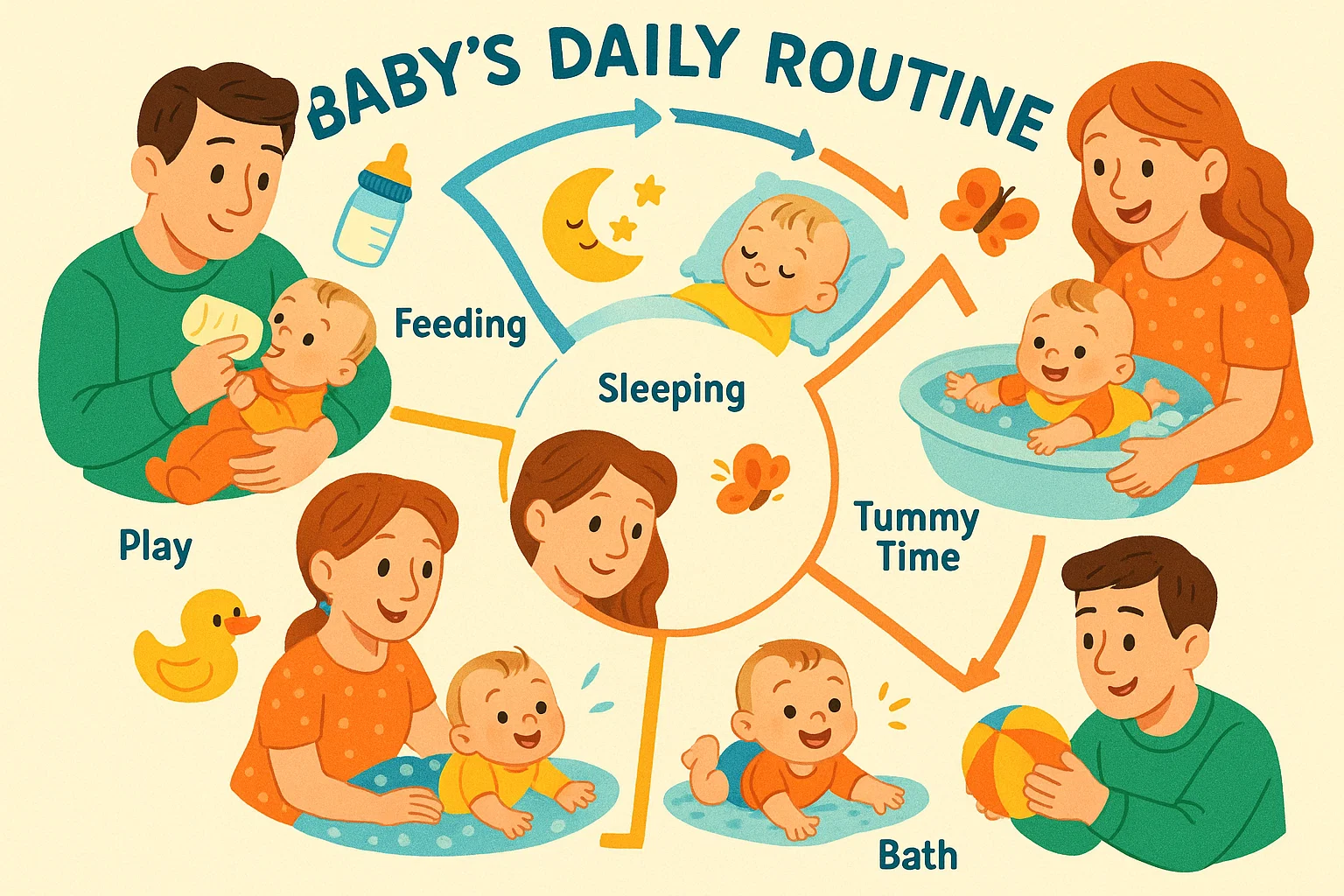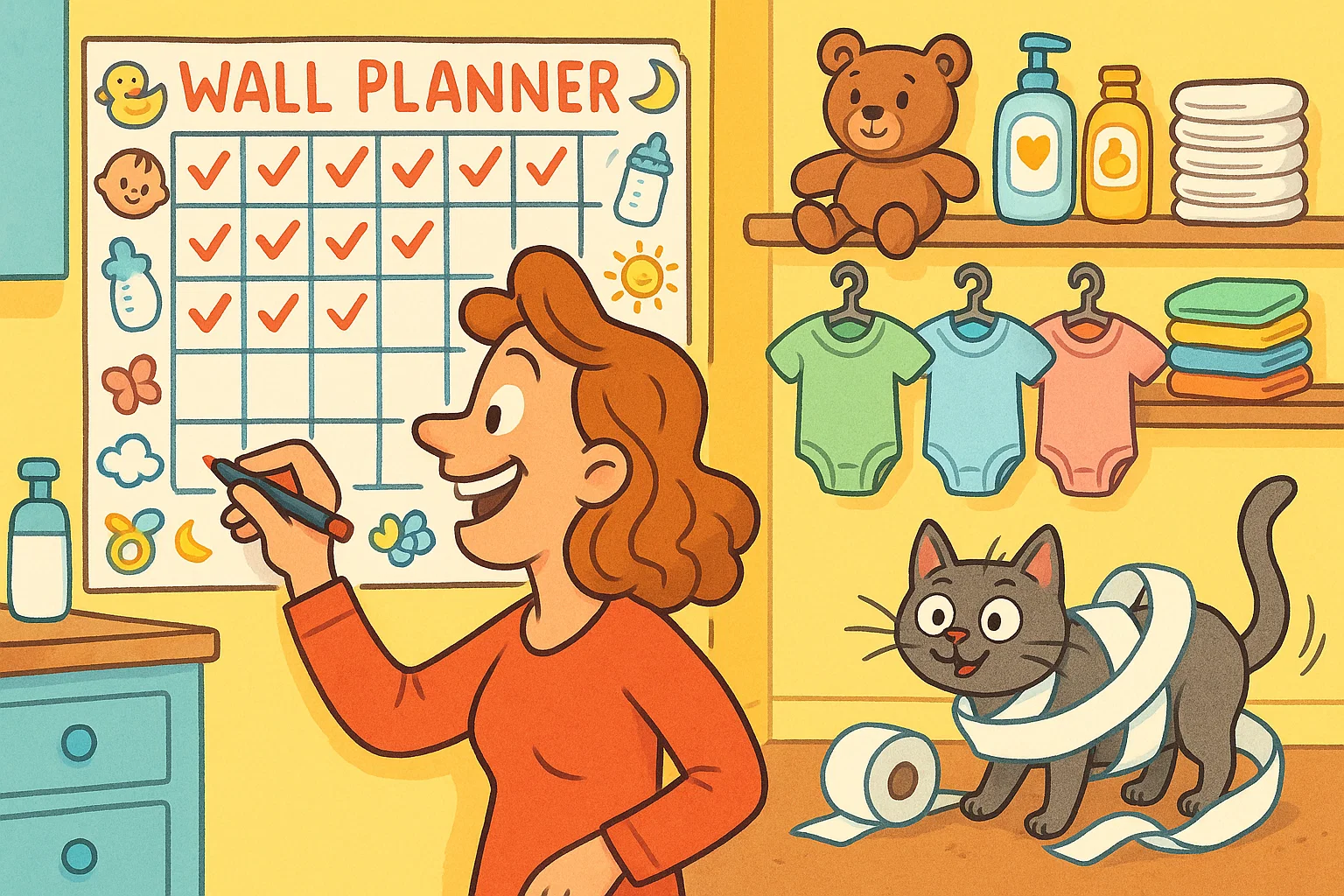Becoming a new parent brings overwhelming joy alongside lots of questions and sleepless nights. Many first-time parents feel unprepared for caring for a new baby, but remember—parenting is a journey, and every seasoned parent once stood exactly where you are now. This comprehensive guide offers essential advice and tips for first-time parents, helping you navigate new parenthood with confidence.
Preparing for Life with a Newborn
Essential baby gear checklist
Focus on safety and functionality when selecting nursery essentials like a safe crib with firm mattress, fitted sheets, and comfortable nursing chair. For clothing basics, your new baby grows rapidly, so purchase 6-8 onesies, 4-6 sleepers with easy nappy access, and multiple changes of clothes. Whether you plan to breastfeed or bottle feed, keep backup options ready. Bottles, burp cloths, and sterilizing equipment will help reduce stress.
Setting up a safe sleeping environment
Creating a secure sleep space significantly reduces SIDS risks. Always place babies back to sleep on firm surfaces, keep cribs free from blankets and pillows, and maintain room temperature between 68-70°F. The NHS recommends room-sharing without bed-sharing for the first 6 months. These steps help ensure healthy baby sleep patterns while giving parents peace of mind.
Stocking up on health and hygiene products
Stock up on digital thermometer, infant acetaminophen (consult pediatrician first), saline drops, gentle baby soap, and fragrance-free moisturizer. Daily care items should include soft washcloths, nail clippers, diaper rash cream with zinc oxide, and hand sanitizer. Know what you need in advance to avoid last-minute stress.
Building Healthy Routines
Establishing feeding schedules
Breastfed newborns typically eat every 1-3 hours while formula-fed babies may go 3-4 hours between feedings. When breastfeeding, feed on demand during the first few weeks and watch for hunger cues. Ensure baby is getting enough milk by monitoring wet nappies (6+ daily) and don’t be afraid to ask lactation consultants for help. Sharing nighttime duties helps both parents bond with the baby while ensuring everyone can get some rest hours at a time.
Creating a bedtime routine
Consistent bedtime routines help newborns distinguish day from night, though baby sleep patterns don’t develop until 3-4 months old. Effective steps include dimming lights 30 minutes before sleep time, giving warm baths 2-3 times weekly, gentle massage, quiet feeding, and soft singing before placing baby in crib awake but drowsy. Cut yourself some slack during those sleep-deprived early weeks.
Encouraging regular nap times
Recognizing tired cues like yawning and eye rubbing prevents overtiredness. Create consistent nap environments, start routines at first tired signs, and keep daytime naps in well-lit areas to maintain day/night distinction. Don’t worry if schedules vary—flexibility remains key during early weeks.

Managing Your Own Well-Being
Prioritizing mental health
Approximately 15-20% of new mothers experience postpartum depression, and fathers can also struggle during this transition. Watch for persistent sadness, severe anxiety, or difficulty bonding, and contact healthcare providers immediately if experiencing concerning symptoms. Join support groups, consider counseling, and practice mindfulness to help you cope with emotional challenges.
Finding time for self-care
Self-care represents some of the best advice experienced parents share. Take 10-minute showers while baby naps, drink hot coffee mindfully, step outside for fresh air, and practice deep breathing. Weekly goals include taking walks, connecting with friends, or asking your partner to handle bedtime routine occasionally. Don’t feel guilty about needing time to recharge.
Accepting and asking for help
Ask for concrete help — a home-cooked meal, a bit of tidying up, or an hour of babysitting can make a world of difference. Accept help from trusted family members, friends, and neighbors. Remember that accepting support allows you to focus energy on bonding and caring for your newborn during this overwhelming period.
Strengthening Your Relationship with Your Partner
Sharing parenting duties
Equitable distribution prevents burnout while helping both parents develop confidence. Talk to your partner about preferences and strengths, then alternate night feedings and nappy changes or create weekly schedules that rotate duties. Whether you’re a new dad learning nappy changes or mom mastering bottles, communication about feeling overwhelmed ensures both parents feel supported.
Scheduling couple time
Share coffee during baby’s morning nap, have dinner after bedtime without phones, take evening walks with baby in stroller, or watch shows together during longer sleep stretches. Simple at-home dates like ordering takeout or giving shoulder massages help maintain intimacy during demanding newborn days.
Communicating openly about challenges
Use “I feel” statements instead of accusations, address issues when both partners are rested, and schedule weekly check-ins about parenting and relationship concerns. Both parents are learning and adjusting, so patience becomes crucial during this transformative period.

Mastering Everyday Baby Care
Bathing and diapering basics
Newborns need baths 2-3 times weekly unless there’s significant mess. Use 2-3 inches of lukewarm water, support baby’s head continuously, work quickly to prevent chilling, and keep room warm. For diapering, change nappies every 2-3 hours, clean front to back, allow air drying time, and apply barrier cream proactively.
Soothing a crying baby
All babies cry as their primary communication. Don’t be afraid—spending time together means you know your baby better than anyone else. Try the 5 S’s method: swaddling, side position, “shh” sounds, gentle swinging, and sucking comfort. Additional techniques include white noise, skin-to-skin contact, taking baby outside, car rides, or warm baths.
Reading baby’s cues
Hunger cues include lip smacking and rooting, while tiredness shows through yawning and fussiness. Overstimulation appears as looking away and arching back, while contentment involves relaxed posture and eye contact. Discomfort manifests as squirming and persistent crying—check nappy, temperature, or positioning.
Staying Organized
Creating a baby care station
Set up multiple stations throughout your home with nappies, wipes, rash cream, clothing changes, and cleaning supplies. Feeding stations need bottles, formula, burp cloths, positioning pillows, and snacks plus phone chargers for long sessions lasting hours.
Tracking feedings, naps, and milestones
Monitor patterns to identify preferences while ensuring adequate nutrition and rest. Use smartphone apps, notebooks, or shared calendars to record feeding times, wet nappies, sleep patterns, and developmental milestones. This proves valuable during pediatrician visits discussing growth and development.
Preparing diaper bags efficiently
Pack feeding supplies, changing necessities, two complete outfit changes, comfort items, plus parent needs including snacks, water, and emergency contacts. Pack more than needed, particularly during first few weeks when learning patterns.

Connecting with Other Parents
Joining parenting groups
Isolation commonly affects becoming a new parent, making connections crucial for support and validation. Hospital classes, library playgroups, neighborhood meetups, and online communities provide opportunities to share parenting advice and normalize struggles while offering practical tips and adult conversation.
Learning from experienced parents
Seasoned parents offer valuable insights, but every family remains unique. Ask specific questions, listen without obligation to follow suggestions, and share discoveries while avoiding comparisons. Accept guidance graciously while trusting your instincts about what works for your family.
Sharing your own journey
Focus on real experiences rather than curated perfection, include challenges alongside celebrations, and connect authentically. Your honest sharing about struggles and joys provides comfort to other parents navigating similar experiences during their parenthood journey.
Encouraging Baby’s Development
Reading aloud daily
Reading creates positive associations while supporting brain development. It strengthens bonds through close contact, establishes calm routines, and introduces storytelling concepts. Focus on rhythm and voice for 0-3 months, choose high contrast images for 3-6 months, and select sturdy books after 6 months while keeping reading enjoyable.
Introducing sensory play
Babies learn through sensory experiences supporting brain development. Newborn ideas include high-contrast pictures, soft music, fabric textures, gentle massage, and colorful mobiles. After 3 months, introduce textured toys, water play during baths, mirrors, rattles, and nature sounds to encourage exploration.
Supporting tummy time
Tummy time strengthens muscles essential for rolling and crawling. Begin with 2-3 minute sessions several times daily, gradually increasing to 15-30 minutes total by 2 months. Make it enjoyable by lying facing baby, using toys for motivation, and taking breaks when showing tired cues.

Managing Expectations
Avoiding comparisons with other families
Social media creates unrealistic expectations, but every baby develops differently. Focus on individual progress, celebrate milestones without timeline pressure, trust pediatrician guidance over internet research, and limit social media if it increases anxiety about parenting choices or development.
Accepting that mistakes are part of learning
Every parent makes mistakes as part of learning. Common experiences include forgetting nappies for outings, misreading cues, or feeling frustrated during crying episodes. Learn by acknowledging errors without harsh judgment, adjusting strategies, and focusing on overall care quality.
Celebrating small wins
Daily victories include successfully soothing crying, getting dressed, completing feeding without spills, taking showers during naps, having partner conversations, and taking walks with baby. Acknowledging successes builds confidence during challenging adjustment periods.
Budget-Friendly Parenting
Buying second-hand baby gear
Babies outgrow items quickly, making used products economical. Safe purchases include clothing, books, toys, high chairs, and strollers, while new items should include car seats, crib mattresses, bottles, and breast pumps. Find quality used items through consignment shops, online marketplaces, and parent groups.
Prioritizing needs over wants
Distinguish between essential and optional purchases. True necessities include safe car seats, adequate clothing, feeding equipment, safe sleep environment, and basic health supplies. Ask whether items improve safety, whether you’ll use them frequently, and whether alternatives exist.
Planning for future expenses
Early parenthood begins expensive child-related costs. First-year expenses include healthcare and nappies costing $2,000-4,000, ages 1-3 childcare costing $15,000-25,000, and preschool activities costing $8,000-15,000. Plan with dedicated savings accounts, research tax benefits, and investigate employer benefits.
Final Thoughts: Trust Your Journey
Becoming a new parent transforms your world, and while first weeks feel overwhelming, millions have successfully navigated this transition. Parenting skills grow naturally as you bond with your baby and trust your instincts.
The best advice seasoned parents share: trust your journey, don’t be afraid to ask for help, and remember you know your baby better than anyone. Some days feel like small victories, others like pure survival—both represent normal parenthood experiences.
Your new baby is fortunate having parents who seek information and prepare thoughtfully. While expert advice provides guidance, you become the expert on your child through daily care. Be patient, celebrate accomplishments, and know that with time, confidence, and support, you’ll develop into exactly the parent your baby needs. Take a walk when overwhelmed, talk to your partner about challenges, and remember this essential advice: parenting is a journey of growth for everyone involved.


